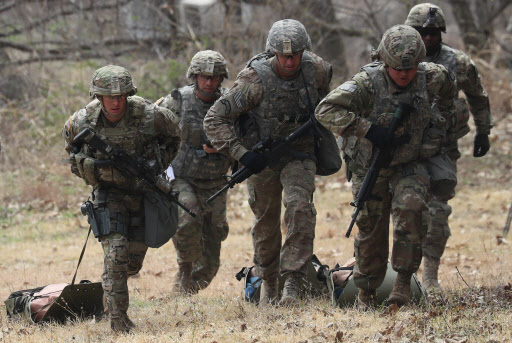South Korea’s presidential office on Friday rejected reports that the US may scale down its military presence in South Korea, amid controversy over a possible withdrawal of US troops.
The New York Times reported Thursday that US President Donald Trump told the Pentagon to “prepare options for drawing down American troops in South Korea” just weeks before his summit with North Korean leader Kim Jong-un.
 |
| US Armed Forces Korea (Yonhap) |
According to Cheong Wa Dae, however, Seoul’s National Security Office chief Chung Eui-yong was informed by a White House NSC official that the reports were false. Chung is in Washington to meet his counterpart John Bolton and discuss Trump’s summit with Kim.
“A key official from the White House NSC has said the report is not true at all,” Yoon Young-chan, the presidential office’s chief press secretary, said in a statement.
The Pentagon declined to confirm the reports, saying “the Department of Defense’s mission in South Korea remains the same, and our force posture has not changed,” Yonhap News Agency reported.
But the news report fueled speculations over Trump’s intentions behind the alleged order to prepare for options to withdraw some of the 28,500 US troops from its major ally South Korea.
Some experts say it is intended to sway in Washington’s favor the ongoing negotiations with Seoul over how to share the cost of the US military forces here, while others say it signals Trump’s intention to use the stationing of US troops on the peninsula as leverage in his talks with Kim.
It is not the first time Trump has hinted that he could pull US troops from South Korea, unless it shoulders more financial burden for American soldiers stationed here. Trump has also associated the stationing of the US troops with other issues, such as trade, to use it as leverage in his negotiations with the Koreas.
Trump said at a private fundraiser in March that “Now we have a very big trade deficit with them, and we protect them.” He reportedly went on to say, “So we lose money on trade, and we lose money on the military. We have right now 32,000 soldiers on the border between North and South Korea. Let’s see what happens.”
South Korea and the US began a new round of negotiations in March on how to shoulder defense costs for the US troops here, as the current agreement expires at the end of 2018. Since 1991, the two countries have held talks to draw up a “special-measures” agreement on the allies’ defense-cost sharing.
The Times, however, said that reducing the US troops is not intended to be a “bargaining chip” in Trump’s talks with Kim in May or in early June, but a peace treaty between the two Koreas could diminish the need for the presence of American soldiers in South Korea.
New Secretary of State Mike Pompeo, who met Kim last month when he was still a CIA director, reported that the North Korean leader was not demanding the withdrawal of all US forces as a condition for a summit with Trump.
The news also added fuel to the ongoing controversy triggered by the two Koreas’ agreement to declare an end to the 1950-53 Korean War within the year during the inter-Korean summit on April 27. They agreed to change the armistice agreement, which has left the Koreas technically at war, into a peace treaty.
The signing of a peace treaty could raise questions over the role of the US armed forces in South Korea, whose mission is largely to deter North Korea’s aggression.
Moon Chung-in, President Moon Jae-in’s special adviser for foreign policy and national security, created a stir after publishing an article in Foreign Affairs magazine saying it will be “difficult to justify” the presence of the US troops here after signing a peace treaty.
The presence of US troops in South Korea, which symbolizes the South Korea-US alliance, has been a sensitive issue in a country deeply divided over ideological lines regarding how they view the communist North Korea.
Conservatives fear that the withdrawal of the US troops could mean a weakening of the countries’ alliance, removal of the US nuclear umbrella over South Korea and the country’s democracy overthrown by the communist North.
Cheong Wa Dae confirmed Thursday that the issue of US armed forces in South Korea was not related to any future peace treaty with North Korea and that the US troops need to be stationed in the country even if a peace deal is signed with North Korea.



